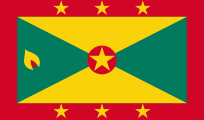INTELLECTUAL PROPERTY RIGHTS IN GRENADA

Opposition Term |
01 Month |
Registration Term |
10 Years |
First Renewal Term |
10 Years |
Subsequent Renewal Term |
10 Years |
Trademarks in Grenada are governed and filed in accordance with the Trademarks Act No. 1 of 2012. The Act is regulated by Statutory Rule & Order No. 18 of 2012.
Trademark applications must be filed with the Corporate Affairs and Intellectual Property Office of Grenada (CAIPO).
It is not necessary for a trademark to be in use in Grenada for it to get registered.
There is a multi-class filing system in Grenada. It follows the 10th edition of Nice Classification.
The opposition period is one (01) month from the date of publication of the trademark application in the Official Gazette. It is also possible to apply for an extension for the filing of a notice of opposition.
Once registered, a trademark lasts for ten (10) years from the date of application and it can be further renewed indefinitely for successive periods of ten (10) years each.
The renewal can be requested after the expiration date during the grace period of six (06) months after the due date. In this case, an additional fee that increases with each late month must be paid.
A registered mark may be subject for a cancellation action by any interested party if it has not been used for three (03) consecutive years.
A patent can be registered in Grenada under the Patents Act, (No. 16 of 2011).
Grenada is signatory to the Patent Cooperation Treaty (PCT), and accordingly, national phase filing of a PCT patent is possible. The same is encouraged if the applicant is seeking coverage in another domicile. A PCT application can simplify the process of seeking a patent in countries that are party to the PCT.
In Grenada, an invention that satisfies the conditions of originality, novelty, inventive step, and industrial applicability, subjects to patentability. Process patent and product patent are the two types of patents that can be protected.
The types of patent applications that can be filed include Non-Convention Application and Convention Application.
Utility models are protected under the legislation dealing with the law on patents.
No pre-grant opposition can be raised against the inventor making an application to attain the patent.
It usually takes about twelve (12) to eighteen (18) months or less for the Registrar’s Office at the Supreme Court Registry to process a patent application for registration. Paris Convention priority can be claimed.
A local patent registration is valid for twenty (20) years. Once the registration has expired, it cannot be renewed.
A utility model certificate shall expire seven (07) years after the filing date of its application and cannot be renewed further.
In order to maintain a patent or a patent application, the owner of the patent or the applicant, is required to pay in advance to the Registrar, for every year, starting one year after the filing date of the application for the grant of the patent, the prescribed annual fee.
Where the period prescribed for the payment of the annual fee expires, and payment of the said fee has not been made, the Registrar shall give the owner of the patent or the applicant, as the case may be, a grace period not exceeding six (06) months, within which he must pay the annual fee.
Grenada is a member of the Paris Convention.
The period of protection of a design is for a sum total of fifteen (15) years.
Annuities are to be paid every five (05) years. A grace period of six (06) months is allowed for the late payment of the renewal fees with additional surcharges.
Any work originating in Grenada, where the author of the work is a national of Grenada or the work was first published in Grenada, is given the same copyright protection in each of the other Berne Convention member countries as Grenada is signatory to the Berne Convention for the Protection of Literary and Artistic Works.
Economic and moral rights are protected during the life of the author and for fifty (50) years after his death.
In the case of a work of joint authorship, economic and moral rights are protected during the life of the last surviving author and for fifty (50) years after his death.

